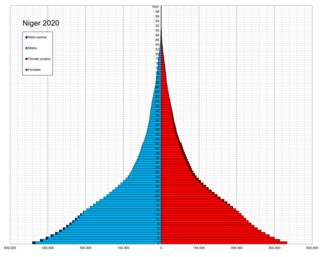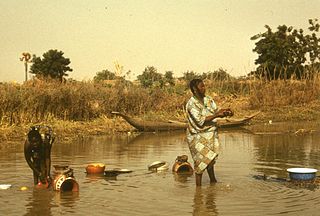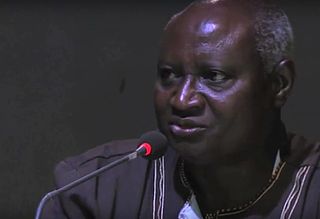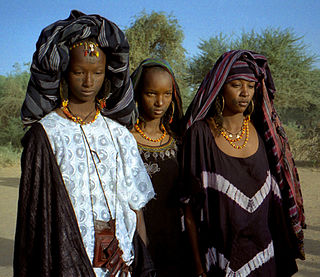Related Research Articles

The demographic features of Nigeriens, the people of Niger consist of population density, ethnicity, education level, health of the populace, economic status, religious affiliations and other aspects of the population.

The music of Niger has developed from the musical traditions of a mix of ethnic groups; Hausa, the Zarma-Songhai, Tuareg, Fula, Kanuri, Toubou, Diffa Arabs and Gurma and the Boudouma from Lac Chad.

The Songhay, Songhai or Ayneha languages are a group of closely related languages/dialects centred on the middle stretches of the Niger River in the West African countries of Mali, Niger, Benin, Burkina Faso and Nigeria. In particular, they are spoken in the cities of Timbuktu, Djenné, Niamey and Gao. They have been widely used as a lingua franca in that region ever since the era of the Songhai Empire. In Mali, the government has officially adopted the dialect of Gao as the dialect to be used as a medium of primary education.

Zarma is one of the Songhay languages. It is the leading indigenous language of the southwestern lobe of the West African nation of Niger, where the Niger River flows and the capital city, Niamey, is located. Zarma is the second-most common language in the country, after Hausa, which is spoken in south-central Niger. With over 6 million speakers, Zarma is easily the most widely spoken Songhay language.

The Songhai people are an ethnolinguistic group in West Africa who speak the various Songhai languages. Their history and lingua franca is linked to the Songhai Empire which dominated the western Sahel in the 15th and 16th century. Predominantly adherents of Islam, the Songhai are primarily located in Niger and Mali within the Western Sudanic region. Historically, the term "Songhai" did not denote an ethnic or linguistic identity but referred to the ruling caste of the Songhay Empire known as the Songhaiborai. However, the correct term used to refer to this group of people collectively by the natives is "Ayneha". Although some Speakers in Mali have also adopted the name Songhay as an ethnic designation, other Songhay-speaking groups identify themselves by other ethnic terms such as Zarma or Isawaghen. The dialect of Koyraboro Senni spoken in Gao is unintelligible to speakers of the Zarma dialect of Niger, according to at least one report. The Songhay languages are commonly taken to be Nilo-Saharan but this classification remains controversial: Dimmendaal (2008) believes that for now it is best considered an independent language family.

Dosso is a city in the south-west corner of Niger. It lies 130–140 kilometres (81–87 mi) south-east of the capital Niamey at the junction of the main routes to Zinder and Benin. The eighth-most populous town in Niger and the largest in Dosso Region, it had an official population during the 2001 census of 43,561. The population grew to 58,671 in the 2012 census. It is the capital of its region - which covers five departments in the southwestern corner of the nation - as well as of its own department, Dosso Department. The city itself lies at the centre of its own Urban Commune.

The Zarma people are an ethnic group predominantly found in westernmost Niger. They are also found in significant numbers in the adjacent areas of Nigeria and Benin, along with smaller numbers in Burkina Faso, Ivory Coast, Ghana, Togo, and Sudan. In Niger, the Zarma are often considered by outsiders to be of the same ethnicity as the neighboring Songhaiborai, although the two groups claim differences, having different histories and speaking different dialects. They are sometimes lumped together as the Zarma-Songhay or Songhay-Zarma.

Niger has 11 national languages, with French being the official language and Hausa the most spoken language. Depending on how they are counted, Niger has between 8 and 20 indigenous languages, belonging to the Afroasiatic, Nilo-Saharan and Niger–Congo families. The discrepancy comes from the fact that several are closely related, and can be grouped together or considered apart.
The Arma people are an ethnic group of the middle Niger River valley, descended from Moroccan invaders of the 16th century. The name, applied by other groups, derives from the word ar-rumah "fusiliers".

Karma is a town and a rural commune in southwestern Niger, near the city of Niamey. The town had a population of 8,505 as of the 2012 census, and the commune had a population of 88,244.
The Kurtey people are a small ethnic group found along the Niger River valley in parts of the West African nations of Niger, Benin, Mali, and Nigeria. They are also found in considerable numbers in Ghana, Togo, Ivory Coast, and Burkina Faso.
Tondikandia is a rural commune in Filingué Department, Tillabéri Region, Niger. Its chief place and administrative center is the town of Damana.
Torodi is a small town and a rural commune in Niger. As of 2012, it had a population of 109,342. As a rural center, Torodi hosts a large weekly market and the seat of local tribal authority (canton). Torodi is in the Say Department of the Tillaberi Region, which surrounds the national capital, Niamey. Say Department, with its capital at the large Niger River town of Say, abuts Niamey to the southwest and across the river to the west. The town of Torodi lies about 60 km due west of the city of Say and 50 km east of the border with Burkina Faso. Torodi itself lies on a tributary of the Niger, the Gourbi river.

Adamou Idé is a Nigerien poet and novelist.

Songhoyboro Ciine or Songhay Ciiné is an upriver dialect of the southern Songhay dialect of Niger. It is spoken mostly in the northwestern corner of Niger's Tillaberi region, an area known as Songhay: from Gorouol, a border town with Mali, down to the towns of Tera, Anzourou, Namari Goungou and Say.
The Maouri people are an ethnic group in western Africa. They are one of the major ethnic groups of Niger, and are concentrated around the Dallol Maouri of the Niger River, extending from Matankari, near Niamey, to Gaya. They are a subgroup of the Hausa people, and speak both the Hausa language and the Djerma language. When using the Zarma language, they are known as the Arawa people.

Women in Niger are women that are from or live in the West African country of Niger. These women belong to a population in which 98% are practitioners of Islam. Laws adopted by the government of Niger to protect the rights of Nigerien women are most often based on Muslim beliefs.

The boubou or grand boubou is a flowing wide-sleeved robe worn across West Africa, and to a lesser extent in North Africa, related to the dashiki suit.
Haoua Issa was a Nigerien singer.

The Songhaiborai are a distinct subgroup within the larger Songhai ethnolinguistic family. Residing predominantly in Niger's Songhai region, Northern Mali, and a minority presence in Burkina Faso. Notably, they trace their lineage to the ruling dynasties of the ancient Songhai Empire.
References
- 1 2 3 Abdourahmane Idrissa; Samuel Decalo (1 June 2012). Historical Dictionary of Niger. Scarecrow Press. pp. 474–. ISBN 978-0-8108-7090-1.
- 1 2 Kadima Nzuji Mukala; Alpha Noël Malonga (2004). Itinéraires et convergences des musiques traditionnelles et modernes d'Afrique. FESPAM. ISBN 978-2-7475-7584-3.